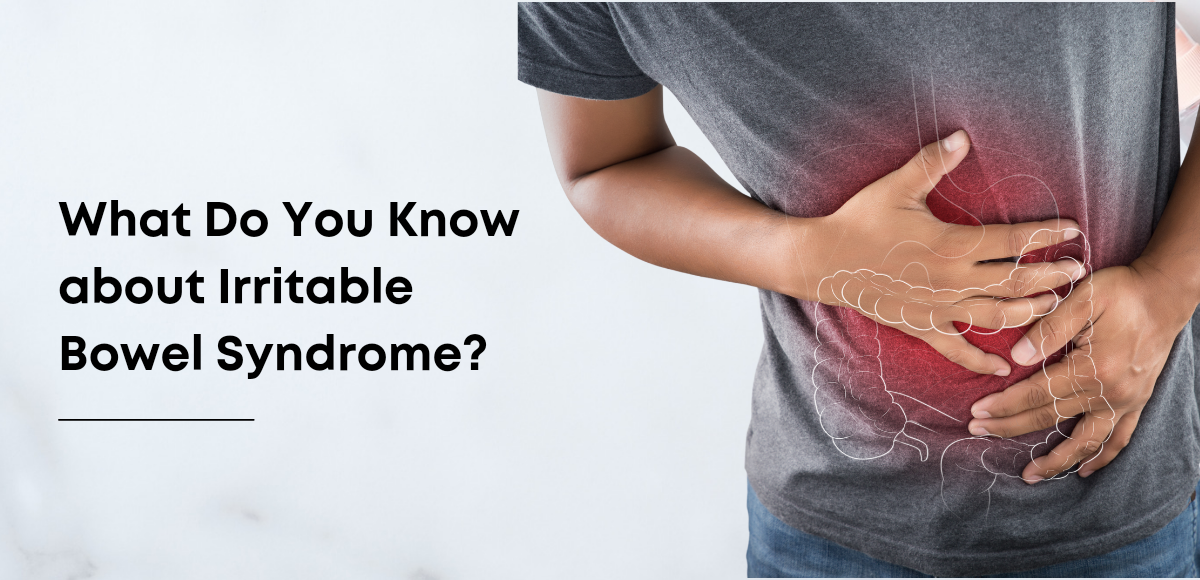

If you have been suffering from abdominal pain for over six months, along with weekly pain for three months and more, then there is a need for concern. You might be affected by IBS known as Irritable bowel syndrome. The abdominal pain might be relieved by bowel movements, and you might notice a change in the frequency of the bowel movements.
What is Irritable Bowel Syndrome?
A chronic illness causing diarrhea, constipation, and sometimes both are referred to as Irritable bowel syndrome. It is a gastrointestinal disorder that affects the large intestines. There is no inflammation visible in the intestines rather it affects the nervous system as the gut and the nervous system are closely linked to each other. Some of the common symptoms of irritable bowel syndrome are a pain in the stomach, bloating, diarrhea, gasses, constipation, loss of appetite, etc.
People with childhood trauma or stressful life events are mainly prone to this condition. Very few people suffer severe symptoms of Irritable bowel syndrome, while others can manage with a proper lifestyle and diet and less stress.
Symptoms of Irritable Bowel Syndrome
Diarrhea
One of Irritable bowel syndrome symptoms is frequent loose stools containing mucus. You may urge immediate bowel movement.
Constipation
Constipation is one of the causes of Irritable bowel syndrome. Constipation predominantly affects nearly 50% of the people with this condition. The slow down in the transit time makes the bowel absorb water from the stools. As the transit time slows down, the stools pass with much difficulty. Drinking more than usual water, intaking probiotics and fiber soluble foods can help.
Stomach pain and Cramps
One of the most common symptoms if you are affected by Irritable bowel syndrome is abdominal pain. The gut and the brain work together indigestion. When releasing the signals, it leads to painful stress in the digestive tract, which causes pain in the abdomen and cramps. The pain in the stomach usually occurs in the lower abdomen and decreases as the bowel movement happens. Some restricted diet or stress-reducing therapies and pain-killing medicines can help reduce the pain.
Bloating or gases
Indigestion in the stomach forms gases in the gut, which causes uncomfortable bloating, which becomes a very frustrating situation while Irritable bowel syndrome.
Food Intolerance
Some specific foods trigger Irritable bowel syndrome symptoms in people with Irritable bowel syndrome. The triggering food varies in people, where they exclude such foods from their diet. Some avoid foods that produce gases while some avoid gluten foods, and some prevent lactose or caffeine.
Bowel movement changes
Irritable bowel syndrome changes the time the bowel stays in the intestines. The bowel can go from loose to hard. When the stool in the intestines passes slowly, they absorb water, making the stools dehydrated, making the stool hard, and a constipation symptom. While, when the stools pass quickly through the intestines, it leaves no time to absorb water making the stools loose which is the characteristic of diarrhea.
Sometimes the stools accumulate mucus, making the stool another bowel change. Blood in the stool is another severe bowel medical condition. The blood may appear red, dark red, or black and tarry inconsistency.
Difficulty in sleeping and fatigue
People diagnosed with Irritable bowel syndrome have low stamina, limiting physical activities, while some have severity to fatigue. The condition also leads to insomnia and sleeping difficulty leaving you sleepless and restless.
Treatment for Irritable Bowel Syndrome
Treatment usually for constipation consists of some diet plans and lifestyle changes. Some lifestyle changes are suggested as
Drinking much water
Increasing the water intake can help the stools pass quickly as being dehydrated makes them dry, making them harder to pass.
Adding fiber-rich foods to your diet
The ability to pass the stools easily through the intestines is provided by fiber to the body—fiber-rich foods such as green vegetables, broccoli, green peas, green beans, and whole-grain bread.
Exercise
Regular exercise keeps your body physically fit and active both externally and internally. Start a workout regime to keep your intestines active.
Scheduling
If you use the bathroom simultaneously every day, your body will tend to have regular bowel movements at the same time. Starting to schedule will be a help.
Managing stress
Managing stress can ease irritable bowel syndrome. Yoga, listening to calm music, relaxing spas, deep breathing, etc., can do wonders in relaxing your mind and body.
More severe symptoms need proper treatment with medication and counseling. Consult a doctor when you feel the severity of the disease. Some of the painful signs are:
- Rectal bleeding
- Uncontrolled diarrhea
- Weight loss
- Continuous pain in the abdomen that is not resolving despite bowel movement or gas
- Anemia
- Fever
- Vomiting
Your doctor may recommend several screening tests like colonoscopy, upper endoscopy, CT scan or X-ray, and lab tests such as Lactose intolerance test and stool test to check for the infection in the intestines.